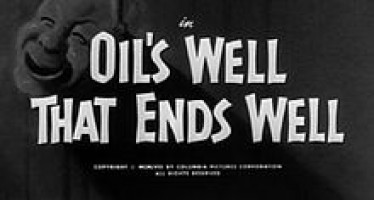CA: State Of Secrecy
By TORI RICHARDS
While Gov. Jerry Brown breezed into office on a platform of frugality and openness, California’s government has shown a mandate of secrecy that could have no end in sight.
In fact, First Amendment experts say that the past decade has been an era of wasteful spending with lawmakers and bureaucrats spending small fortunes to ensure that information doesn’t become public.
“The past 10 years it’s been getting worse,” said Terry Francke, founder of Californians Aware, a government watchdog group. ‘The real problem is not so much new decisions to restrict access as the extreme difficulty of getting legislation that would improve access.”
Despite mounting pressure from journalists and citizens who want accountability in government, California has an abysmal record of openness and refuses to even follow a new mandate imposed by the state court system upon itself to mirror the Public Records Act.
“When it suits them, they will very often say no (to information requests),” Francke said. “The reason why they feel confident in saying no is that the law is perceived as impossible to enforce because you have to go to court.”
Indeed, only one of eight bills introduced by the Legislature last year seeking transparency were signed into law, while other requests for access were battled out in the courts costing taxpayers hundreds of thousands of dollars.
Transparent Brown?
Will Brown do anything to change this? It’s tough to say, because his top campaign officials ignored numerous requests for information on his transparency agenda in preparation for this article. During the campaign, his Web site proclaimed: “Jerry Brown’s Record on Open Government.”
The site listed Brown’s accomplishments as secretary of state, governor and attorney general. It said:
- Brown authored the Political Reform Act of 1974 passed by voters establishing the nation’s toughest campaign disclosure and lobbying regulations;
- Brown signed legislation creating the Legislative Open Records Act, which increased accessibility of public records in the Governor’s office, courts and Legislature;
- Brown’s office of Attorney General has streamlined how it responds to requests and kept costs down for those seeking information by using a central tracking system.
The Political Reform Act governs the disclosure of political campaign contributions and spending by candidates and ballot measure committees. It also sets ethics rules for state and local government officials that impose limits on decisions or votes that affect the officials’ financial interests. The act also regulates lobbyists’ financial disclosures and practices related to the Legislature and state agencies.
The Legislative Open Records Act made some records available to the public after Jan. 6, 1975 – the year Brown began two terms as governor. Ironically, after he left office legislation was passed restricting access to gubernatorial records without permission of the governor. This law was made retroactive covering Brown’s tenure and expires after 50 years even though the U.S. president has such a shield lasting only a dozen years.
Peter Scheer, executive director of the First Amendment Coalition, doesn’t think Brown is as pro-transparency as he depicts.
“He definitely had some responsibility for creating that law” restricting access, Scheer said. “All the subsequent governors have invoked that law and denied public access to records. It seems absurd that Nixon’s records are available after 12 years but not Jerry Brown’s.
“There are things in there that would be at least a political embarrassment, so if you can make those things secret, why not?” Scheer said. “If reporters go rooting around in records, they will find things critical of you, not favorable.”
Scheer requested access to Brown’s records, which was granted. He also requested a mandate of opening the records to all, something that was ignored by Brown. Scheer felt he may have been granted access just because of his title and wondered about the average citizen.
However, Brown’s attorney general spokeswoman Christine Gasparac said 11 requests have been granted and no one has been denied. CalWatchdog.com requested access about a month ago and has not received an answer.
It’s against this backdrop that Brown takes the governor’s mantle from Arnold Schwarzenegger, a leader who has frequently vetoed open public records legislation by a few lawmakers who have managed to squeak by legislation.
“I think the governor-elect will be better on open government issues than our current governor,” said state Sen. Leland Yee, D-San Francisco, an open records advocate. “While Schwarzenegger often talked about blowing up the boxes and letting the light in, his actions rarely matched his rhetoric. My experience with Jerry is that he is a straight shooter and I am looking forward to working with him on these transparency issues.”
Uphill battle
Often voting his conscience and rallying on behalf of public access, Yee has found himself on the opposite side of the status quo regarding government transparency.
He founded the Senate Committee on Public Records and Open Meeting Laws in which he wrote bills that became law closing loopholes in the Public Records Act. This has included the following disclosures: state university governing board records in 2007; government audits and contracts in 2008; and university audits in 2010. College media was also given free speech protection.
His biggest battle was with Schwarzenegger, who vetoed bills introduced by Yee in 2009 and again this year aimed at making university auxiliaries and foundations subject to the Public Records Act.
Schwarzenegger justified this by saying such organizations were private and making donations public would have a chilling effect. This issue was brought to a head in April when Yee filed a public records request with CSU Stanislaus, asking for documents related to an upcoming campus speech by Sarah Palin, who commands six-figure speaking fees.
The university balked, saying it had no such documentation but Yee fired back that he had evidence to the contrary for the fund-raiser hosted by the school’s foundation. “What other documents and correspondence are they hiding?” Yee told The Associated Press.
Neither The AP nor Yee were able to obtain any financial information regarding Palin’s appearance, even though foundation staff are mostly university employees and operate on campus.
Another notable incident happened when Yee tried to buck the system by offering to release his schedule to the AP for a story it was doing on legislators’ schedules. Yee was the sole legislator out of 120 willing to release his schedule to the news agency, but was prohibited from doing so by the Senate Rules Committee.
The committee claimed schedules weren’t part of the Legislative Open Records Act under a clause that excludes drafts, notes, memoranda and personal files. The governor and attorney general make their schedules available to the press.
“As an advocate of government transparency, I respectfully request that my schedule be publicly released,” Yee wrote in a follow-up letter to Greg Schmidt, secretary of the senate. Again it was denied.
While disturbing, nothing can compare to the shroud surrounding the passage in October of California’s latest budget. It passed before the public had a chance to see the 800-page document and wasn’t available immediately afterward either. An assemblywoman admitted to the Sacramento Bee that she didn’t even see the package until shortly before her vote.
All of this despite a deal that was hammered out nearly a week earlier in a closed session that was not discussed with the media.
“The details will come out next week,” Schwarzenegger’s spokesman told the LA Times.
A bad rating
When it comes to comparisons with other states, California doesn’t really stack up.
U.S. Public Interest Research Group (a coalition of advocacy organizations) gave the state’s website a “D” rating. A bill relating to developing a site containing contract grants, purchase orders, subcontracts, tax refunds, rebates and credits died in committee. Tax subsidies to corporations are missing from the site; and while the public can access a given state agency and its contracts, no justification for the expense is listed and often no vendor.
For example, a $16.5-million contract with the Department of Boating and Waterways lists the vendor as “unknown” for business with the San Francisco Marina West Harbor.
Schwarzenegger vetoed legislation requiring more detailed reporting of contracts.
The Better Government Association gave California an “F” for its responsiveness to Freedom of Information Act requests and ranked it 19th in the nation for transparency and ethics. The top three states were New Jersey, Rhode Island and Hawaii, with South Dakota, Vermont and Alabama at the bottom.
“The Legislature is just terrible,” said Scheer of the First Amendment Coalition.
“The average individual has the right to scrutinize government and get information,” added attorney Paul Boylan, who has filed dozens of Public Records Act lawsuits against government agencies. “We need to have someone go out there and ask the courts what they think and have them say, ‘This is the law. It’s the public’s right to know.’ ”
A big success
Open records advocates scored a big victory against the Legislature last year when the First Amendment Coalition sued to gain access to a state database detailing information on bills and amendments to bills.
This information would tell the public the about influences by lobbyists or campaign contributors on pieces of legislation. It would allow the media and general public to do an in-depth analysis on certain interest groups or legislators.
“One of the areas where transparency is hard to get is in the area of data,” Scheer said. “Governments are in possession of huge amounts of data. It’s the new frontier in Public Records Act requests.”
The state refused to provide the database, but rather referred Scheer to its Web site, where access to bills is available in a piecemeal fashion without ability to do a cross analysis.
After bringing the case to court, the legislature decided to settle it in favor of the plaintiffs, which also included MapLight.org, a non-profit research organization.
Two years ago both these plaintiffs successfully sued Santa Clara County in a similar type of case to gain access to a database containing geographic information.
“What matters to citizens is information to hold government accountable and how it’s stored is irrelevant to the public’s right to know,” said Daniel Newman, MapLight.org’s executive director.
Another recent victory, but thanks to the courts and not the Legislature, involves access to pension information.
The California Public Employees Retirement System (CalPERS) began releasing data after the California Supreme Court decided in 2007 that salaries of all government officials by name were deemed public. The same didn’t hold true for other smaller pension systems throughout the state, which refused.
“People also asked for the same information from various counties and they encountered resistance,” Scheer said. “We sued. We were joined by the Sacramento Bee and the Modesto Bee, and there was another case in San Jose that someone else brought.”
While the Supreme Court has not ruled on this issue, the lower courts have and it was in favor of the plaintiffs.
Law enforcement
One of the biggest areas of secrecy continues to surround law enforcement with no end in sight.
Gov. Pete Wilson instituted a ban on media interviews in prison and a bill that would have overturned and allowed confidential correspondence between prisoners and the media was vetoed by Gov. Gray Davis. This remains in effect today.
Release of police reports is a gray area not specifically spelled out in the Public Records Act and the public relies on the whim of the police agency.
A 2007 Supreme Court decision sealed records involving police officer conduct, meaning that the public has no right to know whether officers have been involved in excessive force, shootings, or disciplinary actions. For two years after that, legislation seeking to overturn parts of this decision died in committee.
Coroner’s reports involving murdered children can now be sealed upon request by their parents. Schwarzenegger signed this law two months ago. It was spawned by the kidnapping murders of two San Diego children by the same man, which sparked a media frenzy. Counties where coroner’s offices are attached to the Sheriff’s Department view autopsy reports as part of the investigation and they are never released.
“I don’t see how things could become more secretive with cops,” Scheer said. “For all intents and purposes, we have a secret police force in California.”
As Gov. Brown comes into office, the media and open records activists eye him with curiosity.
“He is an interesting unknown quantity,” Public Records Act attorney Boylan said. “I don’t believe he is the same guy he was when he was governor last time. He seems like he is coming in now and talking about things he never said before, such as fiscal responsibility.
“I don’t know what he is going to do. He claims that he may champion public transparency; I think he may do it. The jury is out on Jerry Brown and what he is going to do. Whatever it is, it will be far better than what we have.”
Related Articles
Is San Diego safest big city? Or having a police crisis?
This good news got prominent play in California’s second-largest city this weekend: For the fourth year running, San Diego had
‘Purge’ movie attacks NRA, Tea Party
June 9, 2013 By John Seiler The new movie, “The Purge,” sounds like it’s the future of California when all
Oil taxes fuel state budget
The group Californians Against Fracking seeks to eliminate oil and gas drilling by hydraulic fracturing methods, called “fracking,” statewide in California. A post-election





